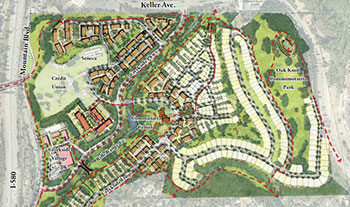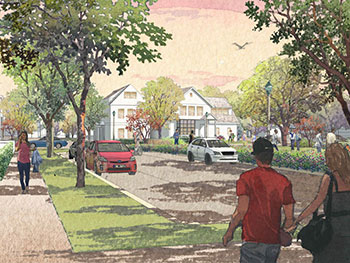Lamphier-Gregory
Urban Planning | Environmental Analysis | Project Management

Urban Planning | Environmental Analysis | Project Management

The former Oak Knoll Naval Medical Center property, a large property located at 8750 Mountain Boulevard in Oakland was initially decommissioned in 1996 and conveyed to the City of Oakland in 2000. The City subsequently sold the property to SunCal, an Orange County developer whose financial partner was Lehman Brothers. In the economic downturn of 2008, Lehman Bros. became insolvent and declared bankruptcy bringing an immediate halt to the Oak Knoll entitlement process, then underway. In 2014, SunCal was able to reacquire the property through the bankruptcy proceedings and took steps to renew its quest for land use and related entitlements for development of the property.
Given the size and complexity of the project and a rapidly expanding workload of entitlement applications pending before the Oakland Planning Division staff, the City determined that to give the Oak Knoll Project the level of intense staff review and involvement it required, the City and SunCal agreed to retain an outside consultant to manage the process; the consultant’s services would be paid by SunCal but would work at the direction of City staff as a contract planner.
Scott Gregory was selected by the City to perform the role of City Planning staff in the handling and processing of the Oak Knoll Project. The contract for services was signed in June 2015.
Oak Knoll is a Master Planned community on a site of approximately 185.5 acres. As proposed and when fully built out, Oak Knoll would be a community of 918 total residences of varying types and densities, a neighborhood commercial center consisting of 72,000 square feet of locally serving stores and services, a 14,000 square foot civic building, using the historically restored and adaptively re-purposed former Naval Officer’s Club (Club Knoll) as a community center with commercial space. Finally, the Project includes substantial amount of open space, restoration of a major creek and public trails.
This project is unique in many ways, beginning with its size which would be common in a suburban community, growing outward as a greenfield development. But Oak Knoll is within the City of Oakland, an urban center, surrounded by well-established neighborhoods and accessed by existing local streets and the 580 freeway, all of which are already saturated with existing peak period traffic.
Planning, financial and environmental issues consumed an enormous amount of time to resolve and were major points of contention between what the City wanted from the developer and what the developer was willing to accept. Scott’s job was to facilitate the resolution of these issues which included:
Affordable Housing: How would the project meet the City’s requirements for housing that would be affordable to below-market households?
Club Knoll: Will SunCal agree to underwrite the restoration of the historic Club Knoll and for what future use would the building be designed and used?
The Barcelona Parcel: On on-going issue was whether to include development of a 5.4-acre parcel of undeveloped City-owned land as part of the Oak Knoll project; the parties were unable to agree on the terms of the transaction and it was ultimately excluded from the Project.
Traffic Impact Mitigation: It was understood and accepted that SunCal would be responsible for constructing numerous intersection and other traffic improvements to mitigate identified traffic impacts. An important issue was at what point in time would the improvements be made: up front, or more gradually, over time, based on the pace of housing construction. A related issue was how SunCal would be reimbursed for improvements it might pay for but for which it was only partially responsible because the problem already exists and the project’s new trips only make it worse.
Neighborhood Commercial Center: City staff and SunCal disagreed about the design of the commercial center.
Restoration of Rifle Range Creek: City staff had serious concerns regarding how the project would restore the creek and maintain it in the future.
Long Term Maintenance: Another major group of issues involved questions of how the major elements of project infrastructure, including streets, street lights, street trees, sewers, storm drains, etc. would be maintained, over time; eventually the parties agreed that City would maintain major elements (based on property tax revenues the City would be receiving) and the future homeowners, through a Community Facilities District, would do others.
Development Agreement: At the tail end of the entitlement process was the issue of a Development Agreement (a ‘DA”). SunCal wanted the City to agree to a 20-year DA that would protect the Project’s vested rights from future change or amendment. City wanted SunCal’s obligations regarding traffic mitigation, affordable housing and other obligations to be ‘front loaded’ so as to occur early rather than be funded more slowly as the project builds out. SunCal was unwilling to agree to the City’s terms and the parties ultimately were unable to come together on deal points and no such agreement was made.
After numerous meetings and hearings before various Oakland advisory and decision-making bodies, including the Landmarks Preservation Advisory Board, Parks and Recreation Advisory Commission, Planning Commission and City Council, the Oak Knoll Project was approved in September 2017. No appeals or legal challenges were filed.
Images courtesy of SunCal Properties


